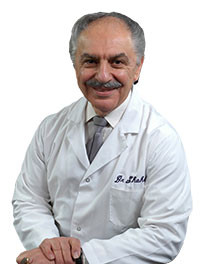Atrial Fibrillation Treatment in Midland Park, NJ
What Is AFib?

Atrial fibrillation, also referred to as AFib, heart fibrillation, or AF, is an irregular heartbeat that can cause serious health complications. Your heart normally contracts then relaxes repeatedly in a beat ranging from 60 to 100 beats a minute. In cases of atrial fibrillation, the upper chambers of the heart develop a fast or irregular heart beat—up to 175 beats a minute—and do not move your blood properly into the ventricles.
Almost 3 million people in the U.S. are living with atrial fibrillation, many with no symptoms. Atrial fibrillation increases your chances of developing a blood clot that can break off and enter your bloodstream, causing a heart attack or stroke . Untreated atrial fibrillation doubles your risk of heart-related death and increases your chances of having a stroke five-fold.
If you have a family history of AFib or are experiencing common AFib symptoms, schedule an appointment with a healthcare practitioner in Midland Park who specializes in atrial fibrillation treatment. Call (201) 806-6099 or contact Dr. M.T. Shahab online.
AFib Causes
Atrial fibrillation almost always involves damage to the heart or abnormalities in the heart structure. These abnormalities and damage may be caused by various factors that contribute to the development of AFib, including:
- Coronary artery disease
- Sick sinus syndrome
- Previous heart attacks
- History of heart problems or heart surgeries
- High blood pressure
- Lung disease
- Viral infections
- Diabetes and metabolic syndrome
- Congenital heart defects
- Abnormal heart valves
- Sleep apnea
- Physical stresses to the body, including recent illness or surgery
- Metabolic imbalances caused by overactive thyroid or other issues
- Exposure to stimulants
Genetics may also play a role, as roughly 30% of AFib patients have a blood relative who also suffers from atrial fibrillation symptoms. In some cases, an irregular heartbeat is not linked to any underlying health conditions—this is known as lone atrial fibrillation.
Atrial Fibrillation Symptoms
The classic symptom of atrial fibrillation is the presence of an irregular heartbeat or palpitations; this includes a sensation that your heart is quivering, racing, hammering or flip-flopping in your chest.
Other atrial fibrillation symptoms include:
- Pain or discomfort in your chest
- Weakness, dizziness, or lightheadedness
- Inability or reduced ability to exercise
- Fatigue
- Confusion
- Breathing problems, including shortness of breath
- Anxiety
- Sweating
If you have any of these AFib symptoms—even if you do not have the classic irregular heart beat—you may still be suffering from atrial fibrillation.
Diagnosing Atrial Fibrillation
To arrive at an atrial fibrillation diagnosis, your healthcare provider will conduct a physical examination and a review of your symptoms. Medical testing may be necessary to confirm a diagnosis and may involve an electrocardiogram (ECG) , blood testing, and stress testing. A transesophageal echocardiography (TEE), in which you swallow a small ultrasound device so that your healthcare provider can see inside your heart atria to check for blood clots, may also be used.
If you are diagnosed with atrial fibrillation, it will be classified as one of the following types or stages:
- Occasional AFib, also known as paroxysmal fibrillation, is diagnosed when your irregular heart rhythm is not long-lasting or persistent. Symptoms may present for a few minutes, or even hours or days, but then cease even without any treatment. Symptoms are sporadic and may occur a few times a year or sometimes daily. It can progress, and episodes can last longer or become more frequent or severe, sometimes developing into persistent or permanent AFib.
- Persistent AFib is diagnosed when your irregular heart rhythm persists for longer than seven days. At this stage of development, your normal sinus rhythm will not resume on its own and will require some form of treatment.
- Long-standing persistent AFib is diagnosed when your atrial fibrillation symptoms have persisted longer than 12 months.
- Permanent AFib is diagnosed when normal heart rhythm cannot be restored.
Treating Atrial Fibrillation
The stage or severity of your AFib—together with other medical conditions you may have—will be taken into consideration when developing a treatment plan. Treatment options range from AFib medications and surgery to lifestyle modifications.
Medications
Atrial fibrillation medications are used to treat the following issues:
- Preventing and treating blood clots using antiplatelets and anticoagulants
- Controlling your heart rate using beta blockers or calcium channel blockers
- Controlling your heart rhythm (pharmacological cardioversion) using sodium channel blockers and potassium channel blockers
Non-Surgical Treatments
Non-surgical interventions to treat AFib include:
- Electrical cardioversion, a procedure in which you receive electrical shock to the chest via paddles or patches to reset your heart to its normal rhythm
- Radiofrequency ablation or catheter ablation, in which a catheter is threaded into the heart to destroy tissue that is malfunctioning and causing AFib symptoms
Surgical Procedures
Surgical procedures to treat AFib include:
- A pacemaker implantation, in which an electrical device is placed under your skin near your collarbone with wires that go into the heart, to regulate your heartbeat through electrical signal
- Open-heart maze surgery, in which a surgeon makes small cuts in the upper part of your heart to create scar tissue that interferes with the transmission of the electrical impulses that cause AFib
Lifestyle Modifications
It is important also to consider lifestyle issues in addressing any heart condition. Proper diet, management of medications, healthy weight and exercise are all part of maximizing heart health. Your healthcare provider may recommend a diet such as the Mediterranean diet or certain supplements, in conjunction with medication or medical treatments.
If you suffer from atrial fibrillation, you are not without options. Request more information about available AFib treatments today. Call (201) 806-6099 or contact Dr. M.T. Shahab online.
Medwell Orthopedics & Functional Medicine for Men & Women
Address
33 Central AveMidland Park, NJ 07432
(201) 806-6099
www.BergenCountyDoctors.com
Hours
Mon:
8:00 am - 8:00 pm
Tue:
2:00 pm - 7:00 pm
Wed:
8:00 am - 6:30 pm
Thu:
8:00 am - 1:00 pm
Fri:
8:00 am - 6:30 pm
Sat:
9:00 am - 1:00 pm
Sun:
By Appointment Only


